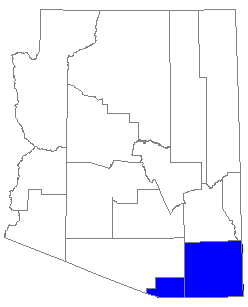 |
 

 |


Dusky Emperor (Asterocampa idyja [Geyer])
Wing span: Not reported.
Identification: Upperside is brown; forewing is hooked. Male forewing with white spots near the tip, and usually a band of yellow spots across the center of the wing. Hindwing has 6 dark submarginal eyespots. Female spots are duller, more diffuse; forewing is broader and not as hooked as in the male. Both sexes have another form in which the colors are paler.
Life history: Males perch to await females.
Flight: October in Arizona.
Caterpillar hosts: Hackberry species (Celtis) in the elm family (Ulmaceae).
Adult food: Rotting fruit and occasionally flower nectar from Lantana, Ageratum, and Tournefortia.
Habitat: Woodlands and their edges.
Range: Cuba and the Isle of Pines, Mexico, Guatemala; rare on Hispaniola and Puerto Rico. A rare stray to southeastern Arizona.
Conservation: Not necessary for a rare stray.
Management needs: None reported.
References:
Bailowitz, R. A., and J. P. Brock. 1991. Butterflies of southeastern Arizona.
Sonoran Arthropod Studies, Inc., Tucson, Arizona. 342 pages.
Riley, N. D. 1975. A field guide to the butterflies of the West Indies. William
Collins Sons & Co. Ltd., Glasgow, Scotland. 224 pages, 24 color plates.
Smith, D. S., L. D. Miller, and J. Y. Miller. 1994. The butterflies of the West
Indies and South Florida. Oxford University Press, Oxford. 264 pages, 32
color plates.
Author: Jane M. Struttmann
State and Regional References:
Bailowitz, R. A. and J. P. Brock. 1991. Butterflies of Southeastern Arizona.
Tucson, Ariz.: Sonoran Arthropod Studies, Inc.
Garth, J.S. 1950. Butterflies of Grand Canyon National Park. Grand Canyon
Natural History Association, Grand Canyon, Ariz.
Opler, Paul A. 1999. Peterson Field Guide to Western Butterflies, revised
edition. Houghton Mifflin Co., Boston, Mass.
Stanford, R.E. and P.A. Opler. 1993. Atlas of Western USA Butterflies.
Privately published, Denver, Colo.
Tilden, J.W. and A.C. Smith. 1986. A Field Guide to Western Butterflies.
Houghton Mifflin Co., Boston, Mass.

